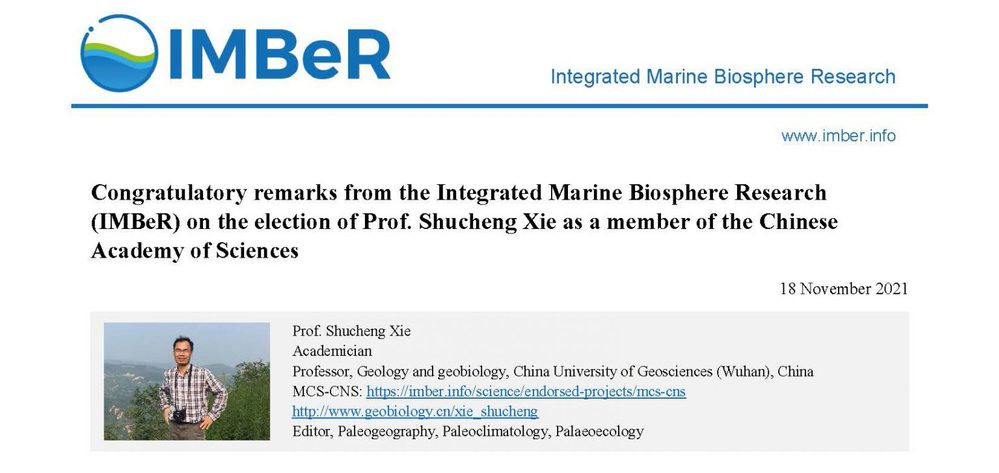
On behalf of the IMBeR global community, we wholeheartedly welcome the announcement from the Chinese Academy of Sciences that Prof. Shucheng Xie, a long-time IMBeR Endorsed Project Leader, has been elected as an academician this year.
Shucheng received a Ph.D. in paleontology and stratigraphy from the China University of Geosciences in 1997 and is now a Professor at the China University of Geosciences. He has determined lipid biomarkers in ice-cores and snow, loess-paleosols, peat deposits, speleothems and lacustrine sediments, and marine sedimentary rocks. Exploration of lipid biomarkers has enabled him to trace paleoenvironmental changes associated with changes in the biosphere over geologic time from the Quaternary (~1.8 Ma or million years ago), through the Permian-Triassic transition (~251 Ma), back to the Mesoproterozoic (1600-1000 Ma).
He has made a substantial contribution to IMBeR with a large-scale multi-disciplinary (marine, life, and earth sciences) multi-institutional project “Mechanisms of Marine Carbon Storage and coupled Carbon, Nitrogen and Sulphur cycles in response to global change (MCS-CNS)” which has been an endorsed project since 2016.
Atmospheric CO2 is fixed in the sunlit surface by plants, transferred to the ocean interior as particulate and dissolved organic matter (biological carbon pump, BCP), and decomposed or transformed into recalcitrant dissolved organic matter (microbial carbon pump, MCP). A small fraction of the BCP flux is buried in the bottom sediment. Once organic matter turns into a recalcitrant form, it stays in the water column for more than a few millennia. Thus recalcitrant dissolved organic matter plays a significant role in carbon storage and mediating global climate change. The MCS-CNS aims to understand the mechanism of the MCP linked to the cycling of C, N and S in the modern ocean. It also attempts to apply the knowledge of modern ocean C, N and S cycling to understand marine faunal mass extinction events that occurred in the geologic past.
His MCS-CNS contributes directly to IMBeR Grand Challenge I (understanding and quantifying the state and variability of the marine biosphere over time) and has contributed scientific knowledge to the UN Sustainable Development Goals by publishing more than 23 scientific papers in peer-reviewed international journals in the last year.
Once again, Congratulations to Prof. Xie and his MCS-CNS research team for being recognized by the Chinese National Academy for his scientific achievements and future contributions.








